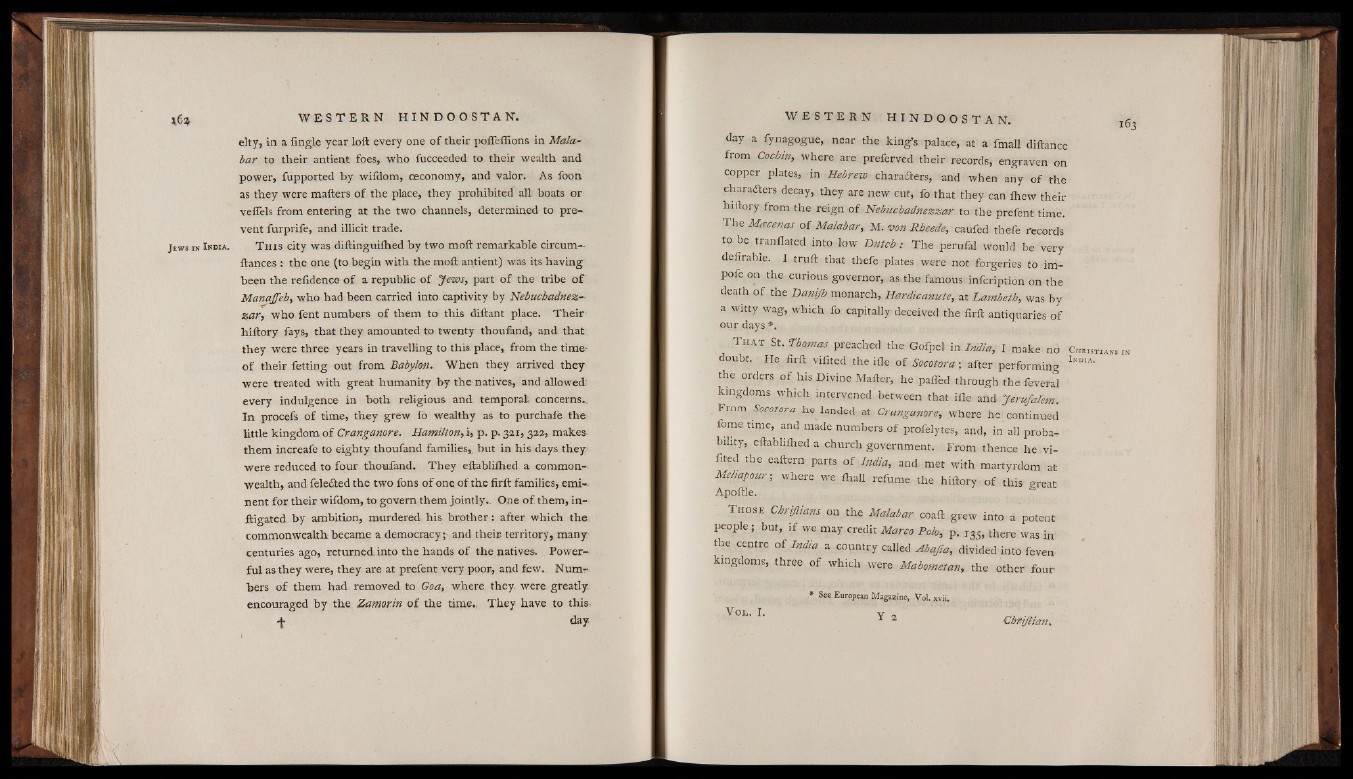
J e w s in I n d i a .
elty, in a iingle year loft every one of their pofTeffions in Malabar
to their antient foes, who fucceeded to their wealth and
power, fupported by wifdom, ceconomy, and valor. As foon
as they were matters o f the place, they prohibited all boats or
veffels from entering at the two channels, determined to prevent
furprife, and illicit trade.
T his city was diftinguifhed by two moft remarkable circum—
ftances : the one (to begin with the moft antient) was its having
been the refidence o f a republic o f Jews, part of the tribe o f
Manajfeb, who had been carried into captivity by Nebuchadnezzar,
who fent numbers of them to this diftant place. T h e ir
hiftory fays, that they amounted to twenty thoufand, and that
they were three years in travelling to this place, from the time-
o f their fetting out from 'Babylon. When they arrived they
were treated with great humanity by the natives, and allowed:
every indulgence in both religious and temporal: concerns..
In procefs o f time, they grew io wealthy as to purchafe the
little kingdomof Cranganore. Hamilton,i, p. p. 321, 322, makes
them increafe to eighty thoufand families, but in his days they-
were reduced to four thoufand. They eftablilhed a commonwealth,
and felefited the two fons o f one of the firft families, eminent
for their wifdom, to govern them jointly.. One of them, in—
ftigated by ambition, murdered his brother: after which the
commonwealth became a democracy;- and.their territory, many
centuries ago, returned into the hands of the natives. Powerful
as they were, they are at prefent very poor, and few.. Numbers
o f them had removed to Goa, where they were greatly,
encouraged by the Zamorin o f the time. They have to this
•j- day.
day a fynagogue, near the king’s palace, at a fmall diftance
from Cocbtn, where are preferved their records, engraven on
copper plates, in Hebrew charaiters, and when any of the
characters decay, they are new cut, fo that they can ihew their
hiftory from the reign o f Nebuchadnezzar to the prefent time.
The Maecenas o f Malabar, M. von Rbeede, caufed thefe records'
to be tranflated into low Dutch : The perufal would be very
defirable. I truft that thefe plates were not forgeries tofinipofe
on the curious governor, as the famous infcription on the
death of the Danijh monarch, Hardicanute, at Lambeth, was by
a witty wag, which fo capitally deceived the firft antiquaries of
our days *.
T h a t St. rbmas preached the Gofpel in India, I make no GhrISTIANS 1N
doubt. He firft vifited the ifle of Socotora; after performing lNDIA‘
the orders of his Divine Mailer, he pafled through the feveral
kingdoms which intervened between that ifle and Jerufalem.
From Socotora he^ landed at Cranganore, where he continued
fome time, and made numbers of profelytes, and, in all proba-
bihty, eftabhihed a church government. From thence he vifited
the eaftern parts o f India, and met with martyrdom at
Mehapour-, where we fhall refume the hiftory of this great
Apoftle. _ s
T hose Cbrijlians on the Malabar coaft grew into a potent
people; but, i f we may credit Marco Polo, p. i 3S, there was in
the centre of India a country called Abafia, divided into feven
kingdoms, three o f which were Mahometan, the other four
V o l . I.
* See European Magazine, V o l im i .
Y 2 Chriftian.